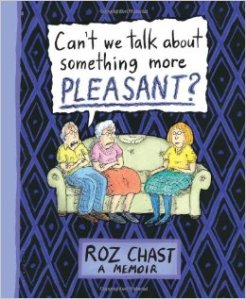I’ve always been a fan of Roz Chast’s cartoons in the New Yorker. With some of her cartoons, I would instantly have a laugh and with others, I might puzzle over it for a bit. But with her 2014 National Book Award Finalist graphic memoir, “Can’t We Talk About Something More Pleasant?, I felt an immediate connection. In this book, Chast details the years that she became aware of her parents aging and accompanying them through their changes and challenges with decline until their deaths. As a single child, she became the recipient over time of all the responsibilities that her parents had previously managed ably on their own, and took on all the new ones involving an uncertain terrain of growing old and needing help.
In her usual style and humor, Chast tackles so many familiar caregiving scenarios: the resistant parent, the denial of change, the “what do you do now?” moments. A dear friend who knew what I was going through with the care of my parents kindly brought a copy from the library to me. Once I opened this book, I was completely absorbed and could not put it down. I was nodding my head, I was laughing out loud, saying to my husband, “Oh my god! They went through this too!” I immediately bought a copy for myself and one for my sister.
One of my favorite parts in the book is a drawing that Chast has of herself dealing with what she calls “all of this ‘real world’, official, and essentially bureaucratic stuff,” referring to the endless, endless paperwork to manage your parents’ finances. She nails it on the head in saying that dealing with this stuff “combined two of my least-favorite feelings: BOREDOM and ANXIETY.” You’ve got to get the book just to see the illustration that goes with this, it really cracked me up.
I also was easily able to relate to the sad moments, the acknowledgement of loss, and yes, the frustration and anger that Chast expresses, with no apologies, through this difficult process. I think that so much of our caregiving media and literature paints a picture of the sainted daughter or other family member who through complete sacrifice and goodness, manages to make everyone happy at the end. I am no saint and even in a few tense moments, have pretended to myself that I am not the daughter, but retreated comfortably into a professional mindset, just doing a job. Otherwise, I was sure that I would lose it. Being that caregiving daughter or son is so fraught with emotions, it can lead to complete frustration and hopelessness. Chast puts that out there in a very real way, warts and all. And then, as most of us do, she moves on to the next challenge.
[twitter-follow screen_name='amandal50dotcom']




